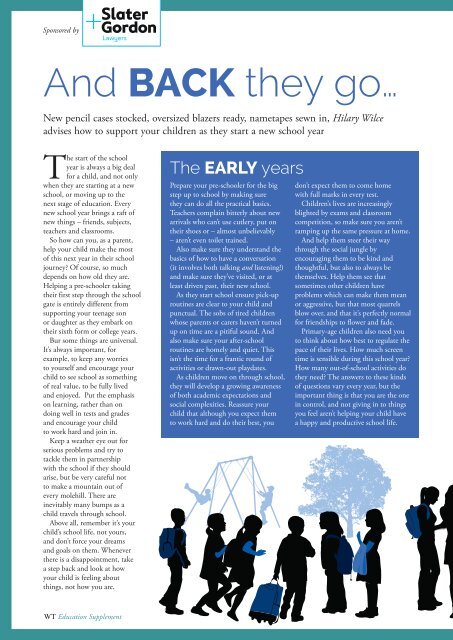Wealden Times | WT199 | September 2018 | Education supplement inside
Wealden Times - The lifestyle magazine for the Weald
Wealden Times - The lifestyle magazine for the Weald
Create successful ePaper yourself
Turn your PDF publications into a flip-book with our unique Google optimized e-Paper software.
Sponsored by<br />
And back they go…<br />
New pencil cases stocked, oversized blazers ready, nametapes sewn in, Hilary Wilce<br />
advises how to support your children as they start a new school year<br />
The start of the school<br />
year is always a big deal<br />
for a child, and not only<br />
when they are starting at a new<br />
school, or moving up to the<br />
next stage of education. Every<br />
new school year brings a raft of<br />
new things – friends, subjects,<br />
teachers and classrooms.<br />
So how can you, as a parent,<br />
help your child make the most<br />
of this next year in their school<br />
journey? Of course, so much<br />
depends on how old they are.<br />
Helping a pre-schooler taking<br />
their first step through the school<br />
gate is entirely different from<br />
supporting your teenage son<br />
or daughter as they embark on<br />
their sixth form or college years.<br />
Bur some things are universal.<br />
It’s always important, for<br />
example, to keep any worries<br />
to yourself and encourage your<br />
child to see school as something<br />
of real value, to be fully lived<br />
and enjoyed. Put the emphasis<br />
on learning, rather than on<br />
doing well in tests and grades<br />
and encourage your child<br />
to work hard and join in.<br />
Keep a weather eye out for<br />
serious problems and try to<br />
tackle them in partnership<br />
with the school if they should<br />
arise, but be very careful not<br />
to make a mountain out of<br />
every molehill. There are<br />
inevitably many bumps as a<br />
child travels through school.<br />
Above all, remember it’s your<br />
child’s school life, not yours,<br />
and don’t force your dreams<br />
and goals on them. Whenever<br />
there is a disappointment, take<br />
a step back and look at how<br />
your child is feeling about<br />
things, not how you are.<br />
The early years<br />
Prepare your pre-schooler for the big<br />
step up to school by making sure<br />
they can do all the practical basics.<br />
Teachers complain bitterly about new<br />
arrivals who can’t use cutlery, put on<br />
their shoes or – almost unbelievably<br />
– aren’t even toilet trained.<br />
Also make sure they understand the<br />
basics of how to have a conversation<br />
(it involves both talking and listening!)<br />
and make sure they’ve visited, or at<br />
least driven past, their new school.<br />
As they start school ensure pick-up<br />
routines are clear to your child and<br />
punctual. The sobs of tired children<br />
whose parents or carers haven’t turned<br />
up on time are a pitiful sound. And<br />
also make sure your after-school<br />
routines are homely and quiet. This<br />
isn’t the time for a frantic round of<br />
activities or drawn-out playdates.<br />
As children move on through school,<br />
they will develop a growing awareness<br />
of both academic expectations and<br />
social complexities. Reassure your<br />
child that although you expect them<br />
to work hard and do their best, you<br />
don’t expect them to come home<br />
with full marks in every test.<br />
Children’s lives are increasingly<br />
blighted by exams and classroom<br />
competition, so make sure you aren’t<br />
ramping up the same pressure at home.<br />
And help them steer their way<br />
through the social jungle by<br />
encouraging them to be kind and<br />
thoughtful, but also to always be<br />
themselves. Help them see that<br />
sometimes other children have<br />
problems which can make them mean<br />
or aggressive, but that most quarrels<br />
blow over, and that it’s perfectly normal<br />
for friendships to flower and fade.<br />
Primary-age children also need you<br />
to think about how best to regulate the<br />
pace of their lives. How much screen<br />
time is sensible during this school year?<br />
How many out-of-school activities do<br />
they need? The answers to these kinds<br />
of questions vary every year, but the<br />
important thing is that you are the one<br />
in control, and not giving in to things<br />
you feel aren’t helping your child have<br />
a happy and productive school life.<br />
WT <strong>Education</strong> Supplement<br />
4


















